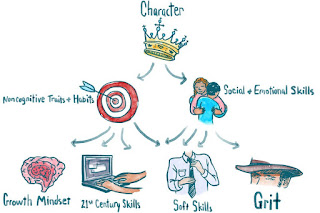Social Emotional Learning
 |
| Dawn Ganje, Program Officer - Training |
In
late June, NMF and Peacemaker Resources' staff attended the Greater Good Science
Center Institute for Educators at the University of California, Berkeley. The lessons learned at this Institute will be
incorporated into the STAR (Students Teaching Attitudes of Respect) curriculum
delivered in the NMF 12-county region.
The
topics covered were varied and powerful.
We attended the conference with 150 education professionals from PreK through the
university level. There was representation from Washington D.C., 22 states and 15 countries from five continents.
Leading researchers shared how to bring emerging brain science to our
schools for the benefit of both the students and the adults who serve them. The
wealth of insight and inspiration abounded and we walked away with essential tools. We now have the practical
tools to boost our students' happiness, well-being and success, as well as our own.
Meena
Srinivasan, MA, NBCT, presented Mindfulness
and Social Emotional Learnings: A Culturally Responsive Approach.
I
appreciated her definition of Social and Emotional Learning (SEL) as a process
through which children and adults develop the fundamental skills for life
effectiveness. These are the skills we all need to handle ourselves, our
relationships, and our work effectively and ethically. Everyone strengthens
their social competencies to connect across race, class, culture, language,
gender identity, sexual orientation, learning needs and age.
Srinivasan shared three questions in relation to Social and Emotional Learning (SEL):
1. How do we intentionally
develop a positive culture and climate in our schools for all members of the
learning community?
2. How are we intentional about
teaching the knowledge and skills of SEL?
3. How do we intentionally
incorporate practicing SEL skills during academic content lessons?
These
are questions that NMF and Peacemaker Resources have intentionally discussed
and incorporated methodologies into our STAR curriculum. We will be broadening our focus on these questions
as we continue to bring STAR to the regions' school districts. We will be offering
in-services to partner schools on SEL and the ways to incorporate SEL
methodology into classroom instruction.
During
our discussion of cultural responsiveness, Srinivasan shared a powerful TED talk,
The Danger of a Single Story.
This powerful
story from Chimamanda Adichie encourages us to move beyond critical
misunderstanding, and embrace the many stories of our lives and our cultures.
Srinivasan shared a definition of cultural
responsiveness as showing up in an interpersonal interaction, mindful of our
own histories, contexts, filters and habits of mind and with curiosity and an
open heart.
We need to enter each encounter willing to be informed and changed
by the interaction and each other’s cultural perspective.
Our goal is to bring lessons learned to the region and to provide an opportunity for schools to prioritize social and emotional development and well-being as a priority for every student through learning, discussion, education and our STAR programs.
For more information about the Greater Good Science Center, please visit: http://greatergood.berkeley.edu/
One looks back with appreciation to the brilliant teachers, but with gratitude to those who touched our human feelings. The curriculum is so much necessary raw material, but warmth is the vital element for the growing plant and for the soul of the child. —Carl Jung






Thanks Dawn for this summary of the conference. I look forward to seeing how this information enhances programs in schools.
ReplyDelete